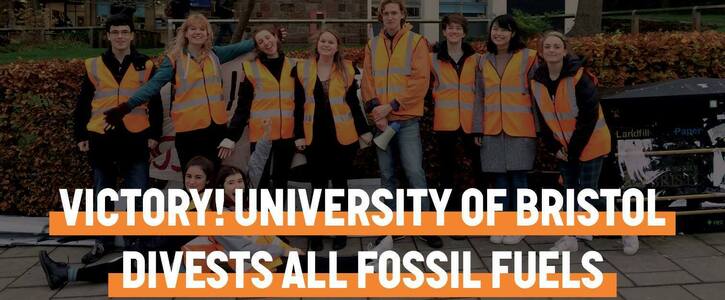Investment in fossil fuel industries drives fossil fuel consumption and its negative environmental impacts. Burning coal, oil, and gas releases CO2 and other greenhouse gases into the atmosphere, both warming and polluting the planet. According to the Intergovernmental Panel on Climate Change (IPCC), if the status quo continues the planet could warm by almost 5oC by 2100 [2]. This would have a catastrophic impact on human life. It would turn our planet into one not “similar to that on which civilization developed and to which life on Earth is adapted”, as James Hansen, a top climate scientist at NASA put it [3].
The second reason is that investment in these companies gives implicit support to their activities. It is the moral duty of the University to withdraw its financial support for companies that actively contribute to global warming, the burden of which is being felt disproportionately by the world’s poorest countries, and which exacerbates global poverty. Divestment from fossil fuel firms will help remove fossil fuel companies’ social license to operate.
The third reason is that investment in fossil fuel companies is illogical when set against the University’s environmental priorities. The Cabot Institute is committed to research surrounding the environment and climate change. Furthermore the university is pledging to become a net carbon neutral campus by 2030. It also has an annually reviewed environmental policy that states that, “protection of the environment is an integral part of good institutional practice” [4].
Besides its dangers, there are strong financial arguments for divestment. As the BP oil spill illustrated, fossil fuel companies operate in risky contexts that can not only damage environments and communities, but also shareholder value. Fossil fuel companies are at the mercy of regulations aimed at preventing climate change. Recent research has shown that, if regulators are serious about preventing climate change, a third of global oil reserves, half of all gas reserves, and over 80% of coal reserves will have to remain unburned to limit global warming to 2ºC [5][6]. This means fossil fuel firms would have to massively write down the value of assets on their balance sheets, leading to huge and sustained destruction in shareholder value.
By divesting from fossil fuels, the University will join a long list of respected institutions already committed to going fossil free, including Stanford University, Glasgow University, Oxford CIty Council, the World Council of Churches, and the Rockefeller Brothers Fund. The global divestment campaign is growing, and together we can make a statement about how we want our future to look.
University of Bristol students and affiliates please provide student or university email addresses.
[1]
http://www.bristol.ac.uk/environment/bristol_european_green_capital_2015 [2]
http://www.climatechange2013.org/images/report/WG1AR5_SPM_FINAL.pdf [3]
http://benthamopen.com/openaccess.php?toascj/articles/V002/217TOASCJ.htm [4]
http://www.bristol.ac.uk/environment/policy/env_policy.pdf [5]
http://gofossilfree.org/uk/about-fossil-free/ [6]
http://www.nature.com/nature/journal/v517/n7533/full/nature14016.html




